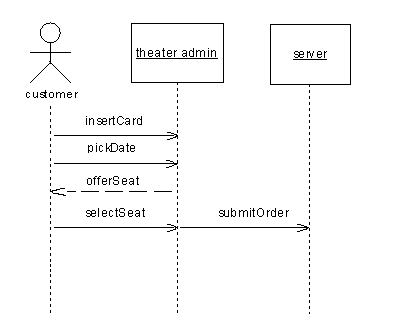An actor is an outside user or set of users that interact with a system. Actors can be humans or other external systems. For example, actors in a computer network system may include a system administrator, a database administrator and users. Actors are typically those entities whose behavior you cannot control or change, because they are not part of the system that you are describing.
An actor can be created in the following diagrams:
A single actor object may be used in a use case, a sequence, and a communication diagram if it plays the same role in each. Each actor object is available to all the diagrams in your OOM. They can either be created in the diagram type you need, or dragged from a diagram type and dropped into another diagram type.
Actors in a Use Case Diagram

In the use case diagram, an actor is a primary actor for a use case if he asks for and/or triggers the actions performed by a use case. Primary actors are located to the left of the use case, and the association linking them should be drawn from the actor to the use case.
An actor is a secondary actor for a use case if it does not trigger the actions, but rather assists the use case to complete the actions. After performing an action, the use case may give results, documents, or information to the outside and, if so, the secondary actor may receive them. Secondary actors are located to the right of the use case, and the association linking them should be drawn from the use case to the actor.
On a global scale, a secondary actor for one use case may be a primary actor for another use case, either in the same or another diagram.
Actors in a Communication Diagram
In a communication diagram, an actor may be connected to an object by an instance link, or may send or receive messages.

Actors in a Sequence Diagram
In the sequence diagram, an actor has a lifeline representing the duration of its life. You cannot separate an actor and its lifeline.
If an actor is the invoker of the interaction, it is usually represented by the first (farthest left) lifeline in the sequence diagram. If you have several actors in the diagram, you should try to position them to the farthest left or to the farthest right lifelines because actors are, by definition, external to the system.
